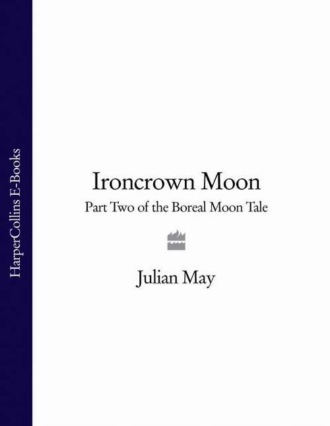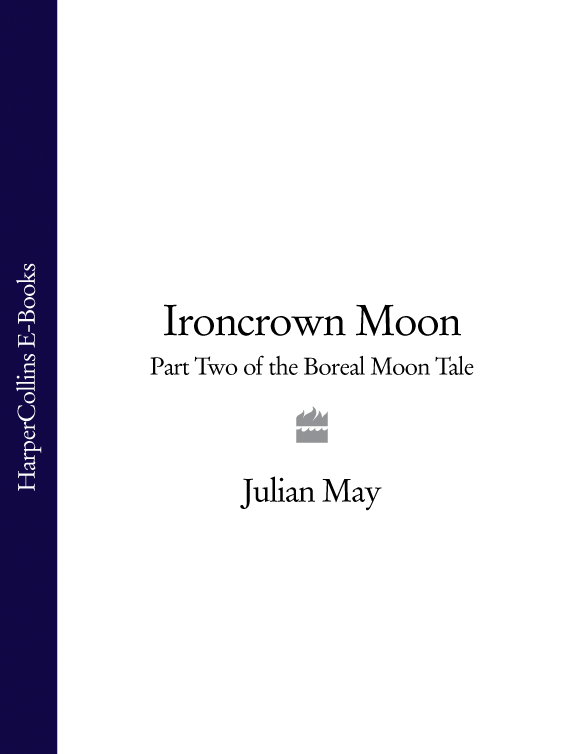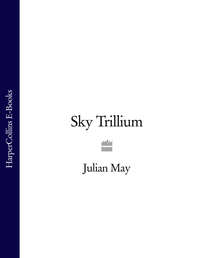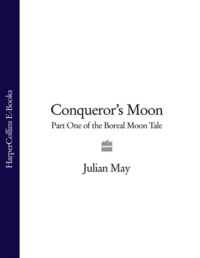
Полная версия
Ironcrown Moon: Part Two of the Boreal Moon Tale


Ironcrown Moon
THE BOREAL MOON TALE BOOK TWO
Julian May

Table of Contents
Title Page
FINAL VERSE OF THE BLOSSOM MOON SONG, AN ANCIENT CATHRAN BALLAD
PROLOGUE
ONE
TWO
THREE
FOUR
FIVE
SIX
SEVEN
EIGHT
NINE
TEN
ELEVEN
TWELVE
THIRTEEN
FOURTEEN
FIFTEEN
SIXTEEN
SEVENTEEN
EIGHTEEN
NINETEEN
TWENTY
TWENTY-ONE
TWENTY-TWO
TWENTY-THREE
TWENTY-FOUR
About the Author
By Julian May
Copyright
About the Publisher
FINAL VERSE OF THE BLOSSOM MOON SONG, AN ANCIENT CATHRAN BALLAD
Down in the waters, cold and deep.
My true love has gone to eternal sleep Long will I wait for his returning, Hoping, my heart afire with yearning
In Blossom Moon, in Blossom Moon, it will never be.
PROLOGUE
The Royal Intelligencer
An unexpected thing happened last night.
As is my habit, I had been working long hours on my Boreal Moon Tale, struggling along despite cramped fingers, dimming eyesight, and the daunting magnitude of the writing project I had set myself at a time when most old men are content to doze and dream. But I have more reason than most to wish my story told to the world – most specifically to the inhabitants of High Blenholme, island of my birth, whose official Chronicle will no doubt be turned all arsey-versey by my mischievous revelations.
I had laid aside my quill after describing the chain of improbable events leading to King Conrig Wincantor’s establishment of the Blenholme Sovereignty, thinking this would be an appropriate place to break the narrative and end the first book of the tale. It was very late and bracingly cool, as nights tend to be during midwinter months in southern Foraile, and the air was laden with the sweet scent of moth-jasmine. Oddly – though I did not fully appreciate the fact until later when I went outdoors the night was almost completely silent. The usual sounds made by nocturnal birds and insects were absent and the murmur of the nearby Daravara River was muted.
After sanding the final closely written parchment sheet, I added it to the rest and locked the manuscript in the copper box that preserves it from the mice and palm roaches that would otherwise make a meal of it. I rose from my desk, paused to work the worst knots from my aching muscles, and blew out the bright flame of the brass desk lamp, plunging the room into near-darkness. A faint illumination came from the lantern that my peg-legged housecarl Borve leaves lit at the far end of the hall to guide me to bed. That was usual. What was not usual was the odd flickering glow coming through the window that looked northward toward the river. The crescent moon had set early and thick foliage made it difficult to see outside. My first thought was of wildfire, since the light was too ruddy and fitful to be starshine. The rains were late this year and the scrubby hills above the jungle valley were tinder-dry. I made haste to the door, slipped outside onto the veranda, and went down the short flight of steps into my riverside garden so as to have a clear view of the opposite shore.
The northern sky was ablaze with immense rippling curtains and thrusting beams of scarlet, green, amethyst and flame-gold, so bright that they dimmed the stars, so active and intricate in their movements that every instinct of the beholder seemed to affirm that this was no mere natural phenomenon, but the work of elemental living beings.
I knew who they were, what they had been – those shining abominations who had fed on pain!
The people of High Blenholme gave them various names: the Beaconfolk, the Coldlight Army, the Great Lights. Their domain is the far north, the arctic barrens and the island in the Boreal Sea from which I had been banished. Never had I seen the Lights during my enforced sojourn on the southern mainland. Early on in my exile, when I had cautiously questioned my manservant Borve about folkloric beliefs in this part of the world, he made no mention of terrible sky-beings in the local pantheon of demons and demigods. Yet here they were, transforming the night of subtropical Foraile into a facsimile of the incandescent heavens above the northland. Was it possible that I was dreaming? I hardly thought so, but it would not be the first time that nightmares provoked by the evil ones among the Beaconfolk had tormented me.
Still less did it seem they should be able to manifest themselves here, so far south! Their once-mighty powers were circumscribed now, pent-up and curtailed so that the pain-eating predators among them might no longer slake their obscene appetites upon humans and other ground-dwelling beings. And yet I seemed to feel something reaching for me, grasping my poor pounding heart with claws of ice and slowly – so slowly – tightening its grip. The chest spasm was tentative and entirely bearable, but my feeble old legs now refused to support my body and I subsided onto my knees, eyes still locked onto that dreadful blazing sky.
I have said that the night was strangely quiet. I was aware of this anomaly almost at the same time that I realized it was not quite true. A ghostly sound was discernible at the very limit of audibility, a sibilance that ebbed and flowed like surf, all the while overlaid with a complex rustling that almost resembled speech. I had first heard its like some sixty years ago, as I lay dying on the Desolation Coast of Tarn. The Coldlight Army had blazed above me then in all its awful strength, jeering at my mortal frailty, ridiculing the notion that a pathetic creature such as I might be able to frustrate its devilish entertainment.
‘But I survived in spite of you!’ I managed to croak, shaking a fist at them. ‘I used your own twisty rules of magic to thwart your schemes. Do you want to know how? It’s simple: I never told you my true name! I’m Snudge, but I’m not Snudge. What d’you think of that, Lights?’
Above me the luminous draperies and glorious colored beacons flared in response to my puny effort at defiance. The faint crackling sound intensified momentarily and I felt a crushing agony behind my breastbone. The pang subsided almost at once and I slowly exhaled, sagging back onto my heels and then sprawling sideways to rest against the trunk of a small tree, eyes shut tight.
Was the pain really of their doing, or was my aging heart simply giving out at last as I dreamt of my old enemies? I waited motionless, in fearful anticipation of a more violent attack that would finish me; but none came, and at length I relaxed, reassuring myself that the lethal capabilities of the Lights were indeed extinct. They could do me no serious harm. I, Deveron Austrey, called Snudge, would live.
When I opened my eyes, I saw that the sky was empty except for the rich expanse of southern stars.
The grand scheme to unite the four disparate realms of High Blenholme into a single Sovereignty was conceived by my first master, Conrig Wincantor, later to be nicknamed Ironcrown, while he was still very young.
Growing up as Prince Heritor of Cathra, the richest and most powerful of the island realms, Conrig idolized his remote ancestor Emperor Bazekoy, the towering personality who first vanquished the great Continental nations of Foraile, Andradh, and Stippen, then set out to wrest control of Blenholme from the Salka and the other nonhuman monsters who had inhabited the place since the dawn of time. The year that Bazekoy’s conquering army sailed up the River Brent marked the beginning of the Blenholme Chronicle.
After a long and glorious life, the emperor chose to return to the island to die – influenced, according to legend, by a dream of Great Lights. Over a thousand years later his remains, interred in Zeth Abbey, were destined to play a strangely influential role in the life of Conrig’s father, King Olmigon of Cathra – as I have already described in the first volume of this Boreal Moon Tale.
Conrig’s own reign began in Chronicle Year 1128, with a triumph and what seemed to be an appalling tragedy. A great sea-battle and a climactic storm in Cala Bay resulted in the defeat of King Honigalus Mallburn of Didion and forced that ill-fated monarch to accept vassal status in Conrig’s new Sovereignty of High Blenholme. As a condition of Didion’s surrender at Eagleroost Castle, in a move that stunned most of the high nobility of Cathra, Conrig divorced his Tarnian wife Maudrayne Northkeep – presumed by him to be barren after six years of turbulent marriage – and pledged to wed Princess Risalla, the younger half-sister of Honigalus.
Although I was only sixteen years of age at the time, I was already closely attendant upon Conrig and serving unofficially as his Royal Intelligencer by virtue of my secret wild talents. Thus I was one of the horrified witnesses who saw Maudrayne calmly put her name to the bill of divorcement, then throw herself off the castle battlements into the wintry sea forty ells below.
I was also a member of the large party who subsequently combed the ice-covered shore rocks for Maudrayne’s body. My uncanny seekersense was then extremely powerful; nevertheless I was unable to detect any trace of the poor suicide. In the days that followed, both the Brothers of Zeth and Conjure-Queen Ullanoth of Moss utilized their magical talents to hunt for the woman Conrig now termed the Princess Dowager, scrutinizing not only the shoreline but also the interior regions of the island, on the improbable chance that she had somehow survived. The searchers found nothing. It was decided that the body must have been carried far out into Cala Bay, to be lost in the frigid depths.
After a month of official mourning, Conrig quietly married Risalla Mallburn. His profound condolences had been dispatched to Tarn, Maudrayne’s birthplace and the only island nation not yet accepting the Edict of Sovereignty. Tarn’s ruler, the High Sealord Sernin Donorvale, reacted with predictable fury to his favorite niece’s public humiliation. In the year following her presumed death, Sernin rebuffed Conrig’s demands that Tarn join Cathra, Didion, and Moss in a unified High Blenholme, even when the Sovereignty ‘reluctantly’ cut off trade with his corner of the island, leaving Tarn at the mercy of rapacious mainland merchants and pirates. Forced to purchase food and other needful commodities from the Continent at inflated prices, the once-wealthy domain grew more and more impoverished and vulnerable.
The injurious effects of the Wolf’s Breath volcanic eruptions which had caused widespread crop failures on the island, shut down Tarn’s all-important gold mines, and precipitated the political upheaval that inspired Conrig’s scheme of unification – were now only a bad memory. Eastern Didion recovered from the famine that had devastated its largest cities. Its pragmatic ruler, Honigalus, rebuilt the capital city of Holt Mallburn that had been devastated by Conrig’s invading army. He regained the trust of Didion’s independent-minded timberlords, whose cooperation was vital to the restoration of his country’s shipbuilding industry, paid off the war reparations demanded by Conrig by building a new fleet of naval vessels for the Sovereignty, and did his best to keep a lid on his fiery younger brother Prince Somarus, who remained implacably opposed to Conrig’s hegemony and considered Honigalus a traitor for having capitulated.
In the tiny kingdom of Moss, which enjoyed First Vassal status in the Sovereignty thanks to Conjure-Queen Ullanoth’s magical assistance to Conrig during the war with Didion, things were apparently tranquil. The queen’s insanely ambitious younger brother Beynor, who had briefly occupied the throne until his imprudent ventures into high sorcery incurred the displeasure of the Beaconfolk, had fled to the desolate Dawntide Isles to live with the Salka monsters. Whenever she gathered strength enough to pay the pain-price to the Beaconfolk, Queen Ullanoth made use of a powerful magical tool, the moonstone sigil Subtle Loophole, to keep watch on Beynor…and to observe other events transpiring here and there about High Blenholme. Part of this intelligence she shared with her sometime lover, High King Conrig. The rest of it she kept to herself, while she quietly pursued thaumaturgical studies and pondered the possibility of seizing control of the Sovereignty herself when the time was ripe.
Early in the spring of 1130, when most Tarnian ports remained icebound and the majority of that nation’s fighting ships were still hauled up ashore, High Sealord Sernin learned that a large fleet of freebooters had set sail from Andradh on the Continent, intending to seize Tarnholme and the other important port cities of Goodfortune Bay – the only section of the Tarnian coast that remained reliably unfrozen in winter. Poised in the mountains above Tarnholme to reinforce the sea invasion was a ragtag but formidable army of insurgent warriors loyal to Prince Somarus, led by robber-barons of western Didion.
Facing an impossible situation, Sernin and his Company of Equals swallowed their pride and sought aid from the Sovereignty, pledging fealty in return. Conrig agreed only after Tarn bowed to draconian conditions. The High King dispatched his new navy to beat off the Andradhians, and commanded his Royal Alchymist to bespeak the hedge-wizards attending rebellious Prince Somarus, warning of nasty consequences if his fighters pressed their attack on Tarn.
The Continental freebooters were soundly defeated at sea, while the prince’s outlaw Didionite land-force scuttled back over the White Rime Mountains into the wilderness of the Great Wold, never having unsheathed their swords.
While these events transpired, I myself grew from a youth into a man. My wild talents ripened with maturity, known only to my royal master Conrig, to his brother Stergos who had become the Royal Alchymist, and to a handful of other trusted intimates of the High King.
During those early years of Conrig Ironcrown’s reign, my duties were important but rather humdrum. I spent most of my time spying on Cathra’s quarrelsome Lords of the Southern Shore, holders of the original fiefdoms established under Bazekoy over a millennium ago. This group of affluent merchant-peers, who had played only a minor role in the establishment of the Sovereignty, remained a continuing thorn in the High King’s side because the ancient laws of Cathra made it difficult for the Crown to increase taxes on their considerable revenues. Also, unlike the rest of the nobility, the Lords of the Southern Shore possessed the immemorial right to veto changes in the Codex of Zeth, the charter affirming the rights and privileges of Cathran aristocracy and defining limits of regal authority – including the succession to the throne. It was the Codex that specifically excluded anyone possessing the least whiff of magical talent from Cathra’s kingship. This rule dated from Bazekoy’s time, and prevailed in Tarn and in Didion as well. Only Moss, youngest of Blenholme’s nations and founded by a brilliant sorcerer, was an exception.
Less than a year after Conrig’s second marriage, High Queen Risalla gave birth to a strapping son who was named Bramlow. Unfortunately Lord Stergos, the Royal Alchymist, almost immediately determined that the child had moderate arcane powers. In a move that surprised and bewildered his Privy Council and loyalist nobility, the High King pressured the Lords of the South to amend the Codex so the boy could be named Prince Heritor in spite of his talent. The lords refused, backed up by the powerful Brethren of the Mystic Order of Zeth, who inflamed the sentiments of the common people against the king’s dubious proposal. In the end, Bramlow was consecrated to the Order as an acolyte, the inevitable fate of windtalented royal offspring.
Excepting Conrig himself…
Oh, yes. My royal master was himself possessed of an all-but-insignificant portion of magical aptitude, imperceptible to the scrutiny of the Brothers. His urgent push to amend the Codex in Prince Bramlow’s favor was actually an attempt to safeguard his own position as High King of Cathra and Sovereign of Blenholme, in case his great secret should be revealed.
I, with my own undetectable ‘wild’ powers, had discovered Prince Heritor Conrig’s puny talent by accident years earlier – and almost paid for it with my life. Instead, the prince decided to make me his personal snudge, or spy. Later, I inadvertently betrayed my master to his older brother Stergos, who kept the perilous confidence in spite of serious misgivings.
Ullanoth of Moss, the beautiful young sorceress who later became that nation’s Conjure-Queen, also knew about the king’s talent, but had motives of her own for not disclosing it. Only two other persons had found out Conrig’s secret: his first wife Maudrayne, whom he believed to be dead, and her friend the Tarnian High Shaman Ansel Pikan, who was very much alive. So far, Ansel had also kept silent. But he remained a potential threat who might possibly betray Conrig and precipitate the dissolution of the Sovereignty. Killing the powerful shaman was no easy option. The only person who might be capable of doing the deed, Ullanoth herself, demurred for fear of offending the touchy Beaconfolk, who were the source of her powers. She did counsel Conrig with the obvious solution to his dilemma: sire a ‘normal’ son as soon as possible. Then, if worse came to worse, the attainted High King could abdicate in favor of the infant Prince Heritor and make use of an obscure point of law to declare himself regent, preserving his grip on the Sovereignty for at least twenty years, until his son’s majority.
Two years after Bramlow’s birth, in 1131, High Queen Risalla was delivered of healthy male twins who were named Orrion and Corodon. Lord Stergos and the other Brothers of Zeth who examined the babies pronounced both of them free from magical talent. Orrion, the elder by half an hour, was affirmed as Prince Heritor.
Unfortunately, the Brethren were mistaken in their assessment of the twins – as I learned to my dismay when I first beheld their tiny faces. As with their father Conrig, I was able to perceive that the infant boys had the faint but unmistakable spark of talent in their eyes. It was my clear duty to inform the king, but perhaps understandable that I should have delayed making the dire announcement. Knowing about Conrig’s own hidden talent had already placed my life at grave risk; if I confessed to knowledge of his newborn sons’ taint as well, who knew what my liege lord might do?
As it happened, I was spared the unwelcome task by none other than Queen Ullanoth, who had scried the little boys from a distance with the powerful moonstone sigil named Subtle Loophole. After confirming her discovery, she did not hesitate to tell Conrig the truth about the twins. She advised the dismayed king to keep the matter secret, continue pressing for a change in the law of succession…and beget still more offspring. In appreciation of the Conjure-Queen’s wholehearted pledge of silence, Conrig doubled the annual benefice already vouchsafed to her loyal but needy little realm in exchange for magical services rendered.
Thus it appeared, as the fateful summer of 1133 began, that most of the problems that had threatened to undermine Conrig Ironcrown and his fledgling Sovereignty were well under control. The realm of Cathra enjoyed unprecedented prosperity. Thanks in part to my own underhanded activities, there was a welcome respite in the intrigues and machinations of the Lords of the Southern Shore. High Queen Risalla was happily pregnant again. Didion’s fractious robber-barons were quiet, licking their wounds following yet another failed small insurrection by Prince Somarus. Embittered Tarn seemed finally resigned to its vassal status and paid its exorbitant taxes without a murmur. The Continental nations had apparently shelved their expansionist schemes for the time being and were content to engage in orderly trade. Even the Dawntide Salka monsters were lying low, not having raided the shore settlements of Moss for over a year, thanks to fierce storms created by Conjure-Queen Ullanoth and a sharp retaliatory strike on the islands by the Sovereign’s navy under Lord Admiral Hartrig Skellhaven.
I myself was a contented man that year, celebrating my twentieth birthday and entry into adulthood on the second day of Blossom Moon.
As part of the great Summer Solstice festival a few weeks later, I was initiated into knighthood together with fifteen other armigers from all parts of Cathra, becoming Sir Deveron Austrey. We received the accolade at the traditional ceremony at noon on Midsummer Eve. To my surprise, I was not made a simple Bachelor like the others but was created a Knight Banneret of the Royal Household in recognition of my confidential services to the Crown. The commander’s honors included a velvet purse containing a hundred gold double-marks, twice the boon vouchsafed to the Knights Bachelor; a smallish fortified manor house called Buttonoaks with a freehold of six hundred goodly acres, situated in the rolling hills below Swan Lake, which was supposed to provide me with a decent income and a place to live when I was not needed at the palace; and the services of two armigers rather than one, together with an apprentice windvoice who would ostensibly enable me to communicate with my superiors via the arcane network of Zeth Brethren. (My own windtalents were, of course, a state secret.)
After the dubbing ceremony, High King Conrig kindly suggested that I quit the court for several weeks and visit my new demesne, which lay less than three days’ easy journey to the north. With the realm at peace and likely to remain so for some time to come, the king anticipated no immediate need for my particular services.
I agreed to the idea eagerly and made ready to leave at once, glad of the chance to avoid the elaborate Solstice banquet and the many entertainments that would take place over the next several days. I found the pomp and splendor of court festivities tedious. In my rôle of Royal Intelligencer, I often moved among the great ones of the Sovereignty; but I had been born a commoner of low estate, the son of a palace harnessmaker, and preferred more modest pleasures.
I invited a close friend, Sir Gavlok Whitfell, to accompany me on my tour of inspection. He was another who esteemed the simple life and was glad of a chance to spend time in the country. Together with our youthful attendants, Gavlok and I left Cala Blenholme city about the sixth hour on Solstice Eve, heading north toward the Swan Lake region. My armigers Val and Wil, and my windvoice Vra-Mattis, newly come to the palace from Vanguard and Blackhorse duchies and Zeth Abbey respectively, were still unfamiliar to me. But they all seemed to be biddable lads and I looked forward to getting to know them better.
I was in a fine humor, anticipating exploration of my manor in the company of congenial men. For a short time at least, I would answer to no master but myself.
ONE
The great outdoor feast in the Cala Palace gardens had come to its conclusion by the tenth hour of Solstice Eve. While servitors dismantled the banquet boards, re-arranged the chairs and benches, and laid out the hardwood dancing floor with its flower-decked standards and strings of twinkling lanterns, the throng of high-born guests slipped away to chambers of ease inside Cala Palace to refresh themselves before the music began.





